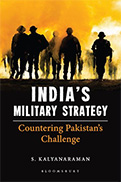Towards a Proactive Military Strategy: ‘Cold Start and Stop’
The article reviews the Cold Start doctrine in light of the limited war doctrine. It argues that the launch of strike corps entails a risk prone war expansion. War termination should therefore be short of the launch of strike corps offensives. It suggests a 'Cold Start and Stop' strategy with limited offensives by integrated battle groups being used to coerce Pakistan. Pakistani amenability to Indian war aims would be dependent on India offering incentives diplomatically alongside. India's limited war doctrine, currently not articulated, must be informed by such a war waging strategy.
- Ali Ahmed
- May 2011










